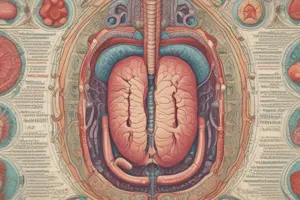Podcast
Questions and Answers
Where does the majority of nutrient absorption occur in the digestive system?
Where does the majority of nutrient absorption occur in the digestive system?
- Mouth
- Small intestine (correct)
- Stomach
- Large intestine
What is the primary role of the pancreas in the digestive system?
What is the primary role of the pancreas in the digestive system?
- Detoxifying the body
- Producing insulin (correct)
- Storing and releasing bile
- Absorbing and digesting fats
Which organ secretes enzymes and bile into the small intestine to aid in digestion?
Which organ secretes enzymes and bile into the small intestine to aid in digestion?
- Stomach
- Liver
- Pancreas (correct)
- Gallbladder
How do nerves and hormones contribute to the digestive process?
How do nerves and hormones contribute to the digestive process?
What is the function of the villi in the small intestine?
What is the function of the villi in the small intestine?
Which organ stores and concentrates bile from the liver?
Which organ stores and concentrates bile from the liver?
What is the main function of bacteria in the gut microbiome?
What is the main function of bacteria in the gut microbiome?
In which organ does the process of digestion begin?
In which organ does the process of digestion begin?
What happens in the large intestine during digestion?
What happens in the large intestine during digestion?
How does the liver contribute to the digestion of fats?
How does the liver contribute to the digestion of fats?
Which organ connects the mouth to the stomach in the digestive system?
Which organ connects the mouth to the stomach in the digestive system?
Why is digestion essential for maintaining overall health?
Why is digestion essential for maintaining overall health?
Flashcards are hidden until you start studying
Study Notes
The digestive system is a complex network of organs and processes that work together to break down food into nutrients, absorb these nutrients into the bloodstream, and eliminate waste products. The system includes the gastrointestinal (GI) tract, which is a series of hollow organs joined in a long, twisting tube from the mouth to the anus, and the solid organs of the liver, pancreas, and gallbladder.
Gastrointestinal Tract
The gastrointestinal tract is where the process of digestion begins. It starts in the mouth with the chewing and mixing of food with saliva, which contains an enzyme that starts breaking down carbohydrates. The food then passes through the esophagus, a muscular tube that connects the mouth to the stomach, where it is further broken down with the help of stomach acid and digestive enzymes.
The partially digested food then moves into the small intestine, where the majority of nutrient absorption occurs. The small intestine is lined with finger-like projections called villi, which increase the surface area for absorption. The liver and pancreas also contribute to the digestive process by secreting enzymes and bile into the small intestine to aid in the digestion of carbohydrates, proteins, and fats.
The food then moves into the large intestine, where water is absorbed, and the waste products of digestion become stool. The stool is stored in the rectum until it is eliminated through the anus.
Solid Organs
The liver plays a crucial role in the digestive system by processing nutrients absorbed from the small intestine and secreting bile into the small intestine to aid in the digestion of fats. It also helps in detoxifying the body by breaking down potentially harmful chemicals and drugs.
The pancreas is another essential organ in the digestive system. It secretes digestive enzymes into the duodenum to break down proteins, fats, and carbohydrates. The pancreas also produces insulin, a hormone that regulates blood sugar levels.
The gallbladder stores and concentrates bile from the liver and releases it into the duodenum to help absorb and digest fats. It also helps maintain a consistent level of bile in the small intestine.
Nervous and Circulatory Systems
The digestive system is also regulated by the nervous and circulatory systems. Nerves and hormones help control the digestive process, and the blood carries nutrients from the small intestine to the liver and other parts of the body.
Bacteria in the GI Tract
Bacteria, collectively known as the gut microbiome, play a vital role in the digestive system. They help break down complex carbohydrates and produce certain vitamins, such as vitamin K. They also help protect the body against harmful bacteria and maintain the integrity of the gut barrier.
Importance of Digestion
Digestion is essential for maintaining overall health. It provides the body with the energy it needs to function, helps support growth and repair of tissues, and ensures the absorption of essential vitamins and minerals. A well-functioning digestive system is crucial for maintaining a strong immune system and preventing digestive diseases.
Studying That Suits You
Use AI to generate personalized quizzes and flashcards to suit your learning preferences.




